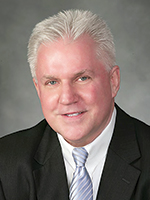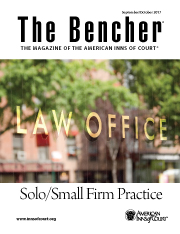Proposed Changes to Federal Rules of Evidence Will Make it Easier to Authenticate Electronic Evidence for Trial
The Bencher—September/October 2017
By Kevin F. Brady, Esquire

 While there was great fanfare for the changes to Federal Rules of Civil Procedure in December 2015, there has been little attention paid to the proposed changes to Rules 803 and 902 of the Federal Rules of Evidence (“FRE”), which could positively influence how parties manage electronically stored information (ESI). The concurrent addition of new subsections (13) and (14) to Rule 902 will enable streamlined authentication of ESI, and potentially eliminate the need to call a witness at trial to authenticate the evidence. The proposed changes are slated to become effective December 1, 2017.
While there was great fanfare for the changes to Federal Rules of Civil Procedure in December 2015, there has been little attention paid to the proposed changes to Rules 803 and 902 of the Federal Rules of Evidence (“FRE”), which could positively influence how parties manage electronically stored information (ESI). The concurrent addition of new subsections (13) and (14) to Rule 902 will enable streamlined authentication of ESI, and potentially eliminate the need to call a witness at trial to authenticate the evidence. The proposed changes are slated to become effective December 1, 2017.
Rule 902 identifies evidence that is “self-authenticating,” i.e., information that can be admitted at trial without being authenticated by a witness. Most of the items listed in Rule 902 are self-authenticating on their face, thus requiring no extrinsic evidence of authenticity for the document to be admitted. Other items, such as those listed in Rule 902(11) and Rule 902(12) (records of regularly conducted activity), are self-authenticating only to the extent the party seeking to introduce them into evidence certifies their authenticity, and provides notice to the opposing party giving them a fair opportunity to challenge the certification. The two new subsections, which permit similar certifications to authenticate electronic evidence, may eliminate the need for a live witness to testify as to the authenticity of ESI, thereby streamlining the process at trial. New subsection 13 would address certifying information generated by an electronic process or system, and new subsection 14 would address certifying data copied from an electronic device, storage media, or file. The expense and inconvenience of producing a witness to authenticate an item of electronic evidence is often unnecessary for two reasons: the adversary either stipulates to authenticity before the witness is called or fails to challenge the authentication testimony once it is presented. As currently proposed, the procedure in the amendments to Rule 902, the parties will be able to determine in advance of trial whether a real challenge to authenticity will be made.
The proposed new subsections to Rule 902 are:
(13) Certified Records Generated by an Electronic Process or System. A record generated by an electronic process or system that produces an accurate result, as shown by a certification by a qualified person that complies with the certification requirements of Rule 902(11) or Rule 902(12). The proponent must meet the notice requirements of Rule 902(11).
(14) Certified Data Copied From an Electronic Device, Storage Media or File. Data copied from an electronic device, storage media, or electronic file, if authenticated by a process of digital identification, as shown by a certification by a qualified person that complies with the certification requirements of Rule 902(11) or Rule 902(12). The proponent must meet the notice requirements of Rule 902(11).
The proposals for new Rules 902(13) and 902(14) would have the same effect of shifting to the opponent the burden of going forward (not the burden of proof) on authenticity disputes regarding the electronic evidence at issue. Shifting the burden of questioning the authenticity of such records to the opponent of the evidence (who will have a fair opportunity to challenge both the certification and the records themselves) will streamline the process by which these items can be authenticated, reducing the time, cost, and inconvenience of presenting this evidence at trial or on summary judgment. The proponent of the evidence will continue to bear the burden of establishing a prima facie case that the ESI is what it purports to be, and of establishing authenticity if challenged, but will not need to go through the expense and inconvenience of using a witness to establish authenticity in the first instance. The opponent, of course, will be able to object to the admissibility of the evidence on any applicable ground.
Kevin F. Brady, Esquire is of counsel in the firm of Redgrave LLP in Washington, DC. He is the past president of the Richard K. Herrmann Technology AIC in Wilmington, DE, and a former member of the American Inns of Court Board of Trustees.
© 2017 Kevin F. Brady, Esq. This article was originally published in the September/October 2017 issue of The Bencher, a bi-monthly publication of the American Inns of Court. This article, in full or in part, may not be copied, reprinted, distributed, or stored electronically in any form without the express written consent of the American Inns of Court.